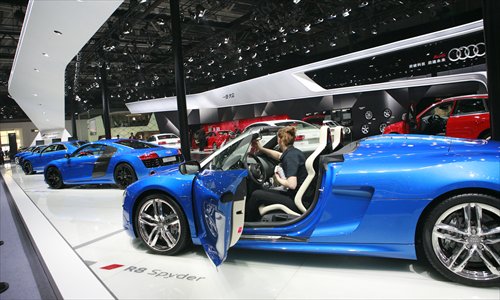FAW, VW in talks on JV stakes
German automaker may see ownership amount increased to 49%

A staff polishes an Audi sedan at the Beijing Auto Show. File photo: CFP

China FAW Group Corp and German carmaker Volkswagen Group (VW) are in negotiations about changing the ratio of their respective stakes in their joint venture (JV) FAW-VW Automotive Co, the JV and VW told the Global Times on Sunday.
The stake change is "ongoing," a FAW-VW spokesperson who declined to be named told the Global Times on Sunday.
A VW spokeswoman said "The Chinese government has approved in principle a possible increase in the stake," Reuters reported on Thursday.
She said the two carmakers have set up teams to evaluate the stake adjustment, according to the report.
Beijing-based newspaper The Economic Observer reported on Sunday that VW's combined share in the joint venture will increase to 49 percent from its current 40 percent. VW currently owns 30 percent while its subsidiary Audi AG has the remaining 10 percent.
China forbids foreign auto companies from having a stake exceeding 50 percent in joint ventures so most joint ventures are owned by two sides with a 50:50 stake ratio.
But FAW-VW, which was jointly founded in 1991 by FAW, VW and Audi, has a stake ratio of 60:30:10.
Under the 50 percent stakes limit, FAW-VW is the only joint venture in which the foreign partner has only a 40 percent stake; therefore it is not a surprise that VW is requiring a stake ratio adjustment, Zeng Zhiling, general manager of LMC Automotive Consulting in Shanghai, told the Global Times on Sunday.
With the planned increase, Audi will see its share rise to 19 percent, according to The Economic Observer report.
VW had put Audi in the JV and Audi is the top selling brand in China's premium car market, Zeng said, noting compared with Audi's performance, its 10 percent stake in the JV is not attractive to Audi.
Zhang Zhiyong, a Beijing-based independent auto industry analyst, said it is reasonable for VW to demand a larger stake since it provides most of the technology to the JV.
VW has called for a share increase for a long time without getting any feedback from FAW until Premier Li Keqiang made an announcement on the issue when he visited Germany last October, media reports said.
VW's CEO Martin Winterkorn said in September 2013 that the company was considering increasing its stake in the JV, according to a Reuters report published earlier.
"China will favorably consider VW's request for increasing its stake in JV FAW-VW Automotive Co, and China also expects that Germany will allow qualified Chinese enterprises to bid for high-speed railway projects in Germany," Li said.
Germany's national railway operator, Deutsche Bahn, said that it was considering buying trains and spare parts from China in the future, the Xinhua News Agency reported on May 26.
Deutsche Bahn's objective is to cooperate with Chinese train makers CSR and CNR, and the company plans to open a purchasing office in Beijing as early as this coming fall, the report said.
As a first step, Deutsche Bahn would reportedly start to buy part of its annually required 35,000 wheel sets from China in 2017, according to the report.
As a State-owned company, FAW will have to cooperate with the central government's decision if the train parts deal between China and Germany is connected with the JV's stake adjustment, according to Zeng.
FAW-VW saw year-on-year sales drops in the Chinese market from February to May, ranging from 5.4 percent to 16.9 percent, news portal sohu.com reported on Saturday.
FAW-VW is not the only automaker facing sales declines because demand in the Chinese auto market has been decreasing since last year, Zhang said.
The declining demand is mainly in the sedan sector, in which FAW-VW is strong, while the SUV sector saw demand grow, according to Zhang.
Another reason is that domestic car dealers have refused to take on high inventory from carmakers since their united protest last year, therefore, year-on-year sales data has declined this year, according to Zeng.